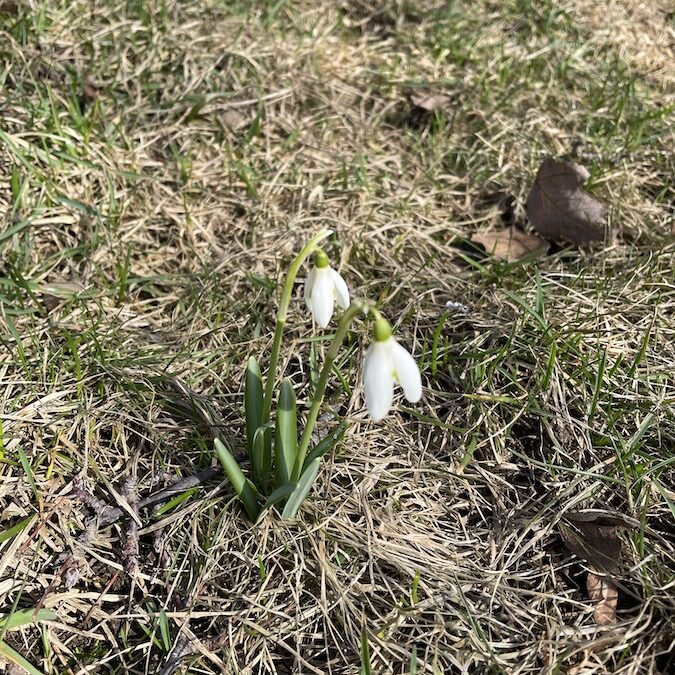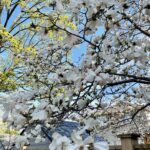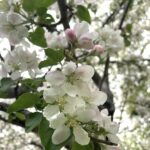While simplicity isn’t a virtue of itself, it is actually that which holds all others – it encompasses all virtues within itself, moves like air through them and ties them with a wind, a breeze, and holds them as if with a gentle hand. Simplicity isn’t about deprivation; it is rather a vow of the heart and spirit to peel away the limits from the meaningless, to allow ourselves an opportunity for a deepening.
A monk once referred to simplicity as part of the virtues of less. Less is more, indeed, though less isn’t about deprivation nor lack in this case – it is about revealing and holding the essence of things. When we de-clutter our internal, and external, we begin to pay attention; and when we pay attention, we begin to notice; and when we notice, we begin to learn to love more deeply and meaningfully. Because – we can only love what we appreciate.
Call into your mind the memory of your childhood’s toy – why did you love it? Amidst all other toys and teddy bears, it was the one you held most and looked for – because you appreciated it – your heart gave it meaning, and you felt emotionally connected to it. Call into your mind Antoine de Saint-Exupéry’s The Little Prince – it took for the prince to come to earth, and find himself in the field of thousands of beautiful roses, in order for him to remember how much his own little wild rose he loved more than any other; and he loved her, because he cared for her, he tended to her, he invested emotionally his heart, his soul, his hands.
We live in a world of consumerism, superficiality, shallowness, and very little substance to things, words and connections. Integrity is a word on the extinction list, as well as loyalty, and unfortunately, love too is often misunderstood, it is only merely a word thrown around for all reasons other than those of the pure heart. In our modern western cultures, it is all about the more. It is the endless pursuit of the more, and the gathering of the unlimited. Unlimited wants, unlimited desires, unlimited options, unlimited partners, unlimited beauty products, unlimited everything. It’s never enough. As human beings we are often gatherers. Especially in time of stress, worry, fear and instability, we gather even more; we seek to settle ourselves into some comfort and to give ourselves a sense of stability, security, a safety net. We all do that, it’s a natural human instinct.
But the unfortunate side effect is that we often do end up with the more. More choices, more things, more stuff, more complexity. And the complexity piles up, the emotional space clogs up; and the mental space clutters. What happens is that we numb ourselves emotionally also – because now there is nothing that can actually give us pleasure and joy. The more has become the nothing, the emptiness, the hardening of hearts. And as the noise of life, and our decisions from “the more” increase, so does our difficulty to see and to notice what is actually important to us, or discern the unimportant from the important. We find ourselves in cluttered environments, with cluttered minds, cluttered emotions, cluttered goals, wants and desires.
This idea of limitlessness, whether in economy or personal life, implies no boundaries, no responsibility, no accountability, and it entitles us to pursue all that we desire without limits and intention. That’s a problem. Because we begin to take for granted all that we do have; we lose gratitude and appreciation, lead unfulfilled lives and ultimately ruin our world by abusing resources and other people. And we also ruin ourselves.
When we overindulge, and over anything, falling into the more and more mentality, we eventually lose joy, pleasure and “taste”. Suppose I want to eat some chocolate – well, I shouldn’t deny that within myself, but if I eat a kilogram of chocolate, and then more tomorrow, I won’t even be able to taste it anymore, I’d feel nauseous, numb, disgusted even. The more pleasure we give ourselves, we more immune to it we become. And the more immune to it we become, we actually lose the pleasure and gratification of the experience. We also subconsciously train our brains, that unless we get what we want right away, and more and more of it, we will walk away.
Simplicity, the expansion of love and heart
Through simplicity we find our path to love, we let love return us to love. It begins with letting go of the clutter and noise. While it may sound easy to do, reduction is remarkably difficult, and even frightening. One of our deepest and most ingrained human fears is poverty – that we’ll be poor, that we’ll be perceived as poor, as lacking, as not enough; and so when we let go of things, we actually fear we’ll be poor or that we won’t have something we’ll need to have enough. But richness is about what is inside of us, and yet it is hard for us to settle into this wisdom and truth because of the way societies work and what we’ve been taught.
We live in a time and place that values the accumulation of material things, of security, of accompplishments, degrees and certificates, of possessions, of likes and followers and popularity contests, and of options. So to move toward simplicity, and serenity and true love, we must become radically authentically courageous, fearless, loyal to our hearts and spirits; we must run in the direction of less amidst a culture that values more.
Simplicity manifests not in theory, but in practice, and it costs us something. It requires of us to limit our options, our possessions, and our limitlessness. It requires of us to sit quiet with only ourselves and what we have within us. It requires of us to unhold our hands from something we hold tightly to perhaps feel secure or held by it.
When we open our hands to let go, to unhold our hands from it, we are then given an opportunity for a deepening, and to be held by life itself, and by something meaningful. We can be held by the present moment. We can be more present. We can be freed. We can have the time to notice and be held by a wild flower, by the snowdrops, by the simplicity of someone telling us I love you. And it is this that holds us.
Simplicity means changing how we approach life in fundamental ways – it is a ritual of approach. It is about seeing clearly, feeling purely, and knowing the important from the unimportant. The main barrier to simplicity isn’t the difficulty of the task itself, but it is rather the psychological barriers and limited belief structures that surround it. Simplicity is a path of letting go, a thousand letting goes and unholding of our hands of what could be for the sake of supporting, holding and nurturing, the things that are truly important.
When we live a life of simplicity, we peel away the barriers inhibiting us from living out of our true self, of our heart’s joy, ability to love and experiencing true freedom. We’re freed from the complex web of distractions and false needs we’ve built into our relationships, expectations and routines or behaviours. This freedom then resonates throughout our life, built upon a strong sense of steadiness and vision. Simplicity allows us a strong sense of freedom and purpose.
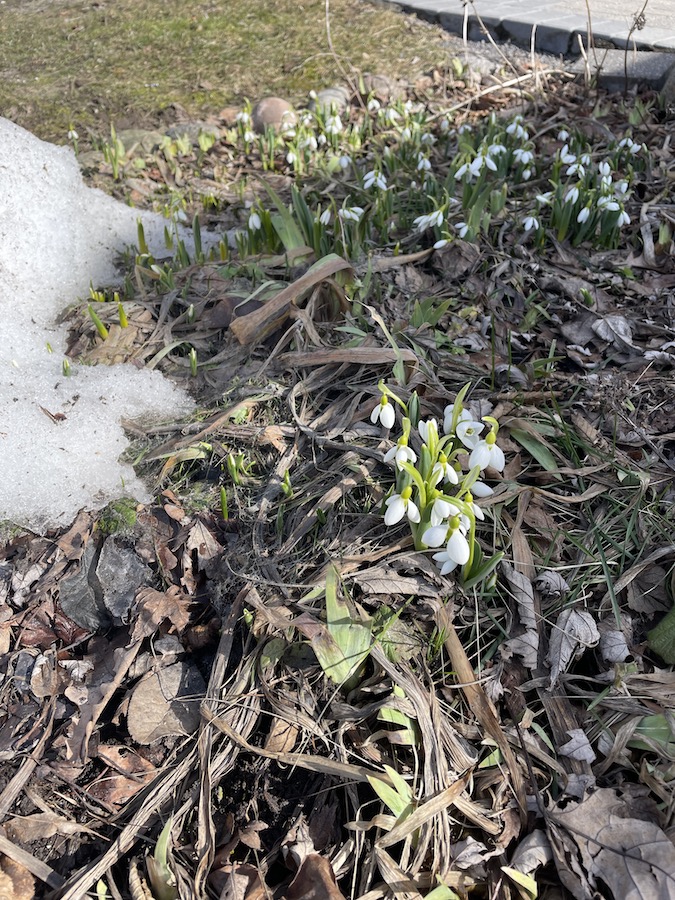
our snowdrops, photo by me
What monasticism teaches us
Many people are attracted to the simplicity of monks, but are far less are attracted to adopting the necessary means to this simplicity – a lifestyle that favors less possessions, less options, and less noise. But the only way to simplify is to reduce. Not in abstraction but in actual lived-in reality.
You see, the purpose of the less in monastic life isn’t just about humility – it is about a deepening and nurturing of the spiritual self, and learning how to love. It is about self purification also. When we don’t have the distractions, we face ourselves. We have no other way than to rely on our inner world, to build a strong spiritual core, to shift our eyes towards the inner lands. When we de-clutter the mental space, the emotional space, the physical space, we reach that which can hold us in a way mystics understand. It’s actually extremely difficult to do. I once spent a night in a monastery in the high mountain and dense forest, and I’ve never experienced such silence in my life – it was so silent that I could hear my own breathing. And each thought, each feeling, each every thing was all right there in front of me, crystallized. There is nothing to do except allow it, sit with it.
You see, monks will tell you that our greatest, yet hardest lesson in life is to learn to love – and yes, it is a hard lesson for them also. People go into monasteries and say “Oh, wow, you are all so peaceful and loving, it is so easy for you.” But very few actually understand the price of reaching that peaceful aura; for it is not easy to love other people in a monastery. You can’t just leave and close the door when someone pisses you off; you stay there and find a way to work things out; you stay there, and at the end of each night you go into your room and face yourself; and the next morning, you go out and need to find a way to accept one another, just as you need to find a way to accept your own self, all your parts. This is what love really is: acceptance. And it is also a being, a being in the present moment, fully present for the other also.
We all have some great and some not so great aspects of ourselves; but there is nowhere to run, we work it out, we can’t divorce our own inner parts and organs, we can’t divorce our eyes from our legs, and we certainly can’t experience new love stories when our inner narratives or the “movie script” is the same. There are no short cuts on the spiritual path – unless we face our inner things and settle it into some acceptance, we are only prolonging the inevitable.
So for the monks, simplicity is part of the path for full acceptance of self, and transcending the limits in order to touch the truly limitless. They gently pare down to the essentials, both emotionally and physically, liberating themselves from the things that weigh down their hearts, mind, body, and spirit.
What appears to be a form of stark deprivation under the surface becomes a form of tending, of nurturing, of loving; it is a gardening to make space in the soil for the most important and beautiful seeds of the coming season to blossom. As we slowly become aware of the unnecessary complexities taking up too much room in our mind, we find ourselves lighter, clearer, more focused, and more capable of engaging the richness and abundance of opportunities that flow all around us.
When we face some limits externally we can then shift our eyes internally and expand. We begin to love. Because we see the essence of things. We touch, and are touched, by the depth of things. A man once told me, “I love you and that’s enough for me. I have a beautiful and kind woman to love, so my heart has the opportunity to love someone; I have my health and the sun rises each morning. Life is simple. It is only people to complicate it all the time.”
So when things get a little too complicated, perhaps we can all just clear out the clutter, and just love. Focus on what brings you joy, hear your heart speak, follow it. How? Well, the language of the heart is joy, so follow the joy. Focus on the moments that bring you joy, the tasks that bring you meaning, and the essentials that allow you to thrive.
Ways & habits to incorporate the practice of simplicity into your life:
Simplify ~ Choose wisely, discern, say no ~ Detach from possessions, focus on the meaningful
Do some inner de-cluttering. Say no to what isn’t fulfilling to you, set boundaries with your time and focus your energy on where you find meaning. Limit social media exposure, limit reading the news, respect your time and your energy, choose where to invest your time and energy. Spend more time in nature and tend to your family and loved ones. In the evenings, after your long day, perhaps spend some time looking up at the starry skies – it reminds us of our proportion and that there is so much more than our inner chatters. It somehow keeps us grounded and in the present moment – by spending some time in quietness and solitude.
Do some outer de-cluttering. Our external environment is an extension of our inner space, so keep things clean and organized. Clean out your closet, donate clothes or sell them or let go of what no longer serves you. Cleaner and simplied spaces relax our minds and allow space for more inspirations to enter us. Perhaps spend fifteen minutes a day focused on simplifying any clutter on your desk, on your walls and in your drawers.
For one month, don’t spend money on anything that isn’t truly an absolute need. At the end of the month reflect on your experience.
Get creative! To re-create an experience of a new dress, perhaps breathe new life into an old one. Take out an old pair of jeans and perhaps start drawing or painting onto them – you’ll have the most unique and cool jeans! Perhaps you have an old skirt, which you can’t use anymore for some reason – but maybe it has some velvety fabric and beautiful embroidery – so perhaps make a bracelet of it. Become an artist, a mystic, create poetry of your things, create new experiences of the old, creativity is often born of limits. Explore and re-explore, this is the art of love, the art of life.
And then notice, truly notice, how what might have appeared a form of deprivation, or a frozen ground, beneath the surface is actually a form of tending, a nurturing, a gardening for something beautiful to show its face. Like snowdrops. Tempted by water, tempted by air, reaching their gentle hands through the soil, to be held by your love – the love in your loving eyes.
For personal readings with me, you are welcome to browse through my Offerings.
Photography by me of our beautiful February snowdrops ❤️
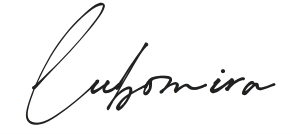
For more of my writings, browse through my Art of Love.
If you wish to support me and my work, you may do so by sharing it or donate here. For personal readings with me, you may visit my Offerings.
Your support means so much to me! Thank you wholeheartedly!

